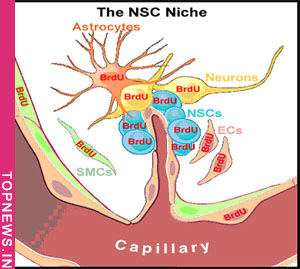Dual role of glial cells may be harnessed to treat neurological diseases
 Washington, May 8 : Glial Cells, which are involved in the survival of nerve cell (neuron), also play an active and major role in the death of neurons in the eye, and can thus lead to therapies for a variety of acute and chronic neurological disorders, including glaucoma and retinal artery occlusion, says a study.
Washington, May 8 : Glial Cells, which are involved in the survival of nerve cell (neuron), also play an active and major role in the death of neurons in the eye, and can thus lead to therapies for a variety of acute and chronic neurological disorders, including glaucoma and retinal artery occlusion, says a study.
In many neurodegenerative diseases- like hypoxic-ischemic brain injury (stroke), trauma, seizures, various forms of dementia and neurodegeneration-a main factor that kills neurons is excessive levels of glutamate, the most abundant excitatory neurotransmitter in many regions of the central nervous system (CNS).
Scientists have for long thought that the toxic effects of glutamate was because the factor overexcites neuronal cells via activation of glutamate receptors and thereby kills them.
"The most interesting aspect of our study and the reason we are so excited is that the pathway leading to glutamate-induced nerve cell death involves another vital player - namely, glial cells. Through careful experimentation we now know that glutamate activates signaling pathways in glial cells that then lead to neuronal death," said Dr. Adriana Di Polo, neuroscientist at Universite de Montreal (UdeM).
Glial cells are the most abundant cell type in the nervous system, and are traditionally thought of as ''partner'' cells to nerve cells providing support, nutrients and an optimal environment.
The new study, however, suggested that glial cells also have a more sinister side that allows them to induce or exacerbate neuronal death in pathological conditions.
"Neuronal cell death induced by glutamate is a key step in a large number of injury and disease settings and this study is important because it provides a road-map for the cellular and molecular events that allow this to occur" says Dr. Philip Barker, a neuroscientist at the MNI.
He added: "The fact that specific signaling events in glial cells are important for inducing neuronal cell death is surprising and suggests new therapeutic targets for conditions that involve excitotoxicity."
The new study focussed on nerve cells in the retina, which convey information from the retina to the brain along the optic nerve, and are the primary link between the retina and the brain.
The death of these retinal neurons from excess glutamate causes vision loss in various neurodegenerative disorders including optic neuropathies.
And when the researchers disrupted the signalling events in surrounding glial cells, they could protect the majority of these neurons, confirming that glial cell events play a key role in death triggered by glutamate.
The findings could lead to the treatment of a wide-range of neurological and neurodegenerative diseases.
The study has been published in The Journal of Neuroscience. (ANI)